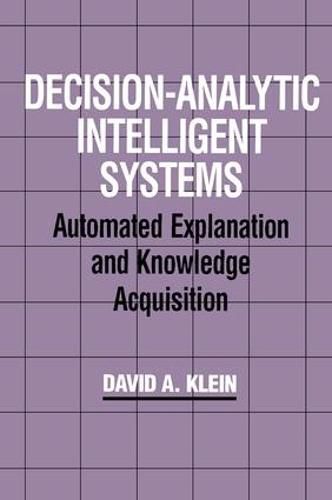Readings Newsletter
Become a Readings Member to make your shopping experience even easier.
Sign in or sign up for free!
You’re not far away from qualifying for FREE standard shipping within Australia
You’ve qualified for FREE standard shipping within Australia
The cart is loading…






This book presents a framework for building intelligent systems based on the mathematical decision models of Decision Analysis. The author provides new techniques for automated explanation and knowledge acquisition in formally sound systems that reason about complex tradeoffs in decisions. Also included are specifications for implementing these techniques in computer programs, along with demonstration applications in marketing, process control, and medicine.
Readers with an interest in artificial intelligence will gain a foundation for building formally justifiable, intelligible, modifiable systems for computing decisions involving multiple considerations, with applications across a variety of domains. Beyond decision models, the methodology of the work reported suggests a more general approach to employing formal mathematical models in transparent intelligent systems.
Decision-analysis experts will find a collection of methods for explaining decision-analytic advice to clients in intuitive terms, for simplifying parameter assessment, and for managing changing preferences over time. The book provides sufficient background material to promote understanding by readers who may be unfamiliar with artificial intelligence, with decision analysis, or with both fields, and such material is labeled to increase the well-versed reader’s efficiency in skipping particular sections.
$9.00 standard shipping within Australia
FREE standard shipping within Australia for orders over $100.00
Express & International shipping calculated at checkout
This book presents a framework for building intelligent systems based on the mathematical decision models of Decision Analysis. The author provides new techniques for automated explanation and knowledge acquisition in formally sound systems that reason about complex tradeoffs in decisions. Also included are specifications for implementing these techniques in computer programs, along with demonstration applications in marketing, process control, and medicine.
Readers with an interest in artificial intelligence will gain a foundation for building formally justifiable, intelligible, modifiable systems for computing decisions involving multiple considerations, with applications across a variety of domains. Beyond decision models, the methodology of the work reported suggests a more general approach to employing formal mathematical models in transparent intelligent systems.
Decision-analysis experts will find a collection of methods for explaining decision-analytic advice to clients in intuitive terms, for simplifying parameter assessment, and for managing changing preferences over time. The book provides sufficient background material to promote understanding by readers who may be unfamiliar with artificial intelligence, with decision analysis, or with both fields, and such material is labeled to increase the well-versed reader’s efficiency in skipping particular sections.